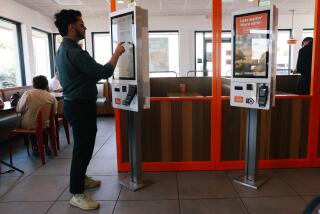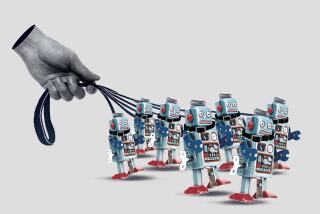‘Expert System’ Picks Key Workers’ Brains : Computers: From airport gate-scheduling to trouble-shooting, technology allows companies to store key employees’ know-how on floppy disks.
- Share via
PHILADELPHIA — In what may be the final indignity of man, companies are asking retiring workers to leave their brains behind, stored on a computer disk.
“Expert system” developers are picking the brains of longtime employees and storing their expertise on floppy disks.
Richard Herrod of Dallas-based Texas Instruments Inc., an expert in artificial intelligence, said that not everyone is a candidate for expert systems. The best prospects are people who know more about a particular job than anyone else--in other words, experts.
“You build an expert system when you have a significant specialized knowledge that exists only in a few people’s heads and is acquired through years of experience,” said Herrod, who recently attended the Instrument Society of America’s annual conference in Philadelphia.
Herrod developed one of his first expert systems for Campbell’s Soup Co., where Aldo Cimino, an employee with 46 years of experience in the soup sterilization process, was about to retire.
Cimino was the trouble-shooter for 72-foot-high sterilizers in which 68,000 cans of soup at a time are heated to 250 degrees.
“If one of those breaks down, you’re up to your ears in bad soup,” Herrod said. “So when there was a problem the people at the plant couldn’t fix, they’d call in Aldo. He had a lot of little tricks and knew how to figure out the problem.”
Cimino, who worked at the company’s Camden, N.J., headquarters, said he was apprehensive when his boss asked him to put everything he knew about his job on a computer disk.
“At first I thought, ‘Oh my God, they’re going to get rid of me,’ ” said Cimino. “But then I realized that I was 64 years old and getting ready to go anyway. They just wanted to save some of what I knew.
“It felt weird at first,” he said. “But I got used to it. It’s like I left a piece of myself at that plant.”
It took seven months for a team of so-called knowledge engineers to pump 46 years worth of know-how from Cimino and store it on floppy disks. When they were finished, Cimino retired. He said the company didn’t pay him any more money for picking his brain.
“I never made a dime, but I’m not complaining. The company always treated me good,” he said.
Campbell’s now has a floppy disk that serves as a permanent consultant when trouble brews.
“Now when something goes wrong with a sterilizer, the maintenance people can stick a floppy disk into an IBM PC, call up the expert system, and interact with it much like they were dealing with Aldo on the phone,” Herrod said.
But Cimino said the computer knows only about 85% of what he does.
“I picked up a lot of information over the years,” he said. “There are certain things that have never gone wrong with the cooker that the computer won’t know how to fix. There’s always going to be a human factor.”
The expert systems are user-friendly, Herrod said. When the program is called up on the computer screen, it displays some basic information, asks the user to take some measurements, and provides a selection of replies to various questions.
Herrod’s team of engineers also has built expert systems for Corning Glass Works and the Calgon Corp. But the technology is not limited to factories. American Express uses an expert system that reads credit cards and decides, based on someone’s spending history, if the cardholder can make a particular purchase.
Texas Instruments developed an expert system for United Airlines that manages the assignment of airport gates at Denver’s Stapleton Airport and O’Hare Airport in Chicago.
“We captured the experience of their gate-scheduling people and installed computers at the workstations,” Herrod said.






